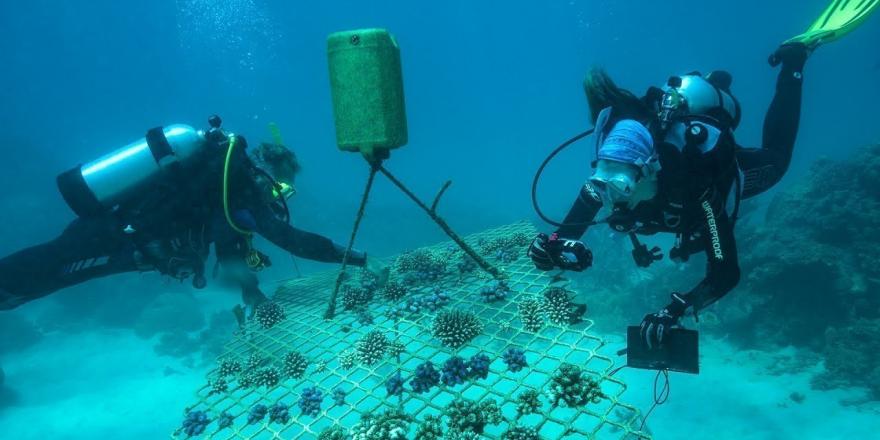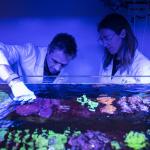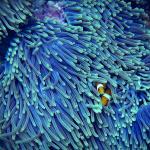The Future Reefs research team studies reef-forming corals, the organisms that sustain the entire productivity and biodiversity of coral reef ecosystems.
Coral reefs are one of the most biodiverse and beautiful ecosystems on the planet, supporting a quarter of all marine life including more than 4,000 species of fish. We focus on the innovation of unique solutions, such as the development of collaborative restoration and conservation approaches at the most valuable (ecological and economic) locations. The main goal of our research is improving reef resilience and health. We are pioneering novel techniques such as tailored nutritional supplements that may improve coral resilience to change and stress (i.e. heat), and hence support adaptation to the “reefs of tomorrow”.
Our team shows what can be achieved using novel technologies and when communities work collectively to benefit the reef and the many stakeholders that rely on reef resources. Our findings and knowledge have the potential to be transcribed across the globe and be tailored to various reef types to improve existing global restoration efforts.

In the current trajectory that we’re on it’s a real possibility that in our lifetime the Great Barrier Reef, at least as we know it, will be lost. During 2016 and 2017 about two thirds of the northern Great Barrier Reef died, so we now think about 50% of the Great Barrier Reef has been lost.
Imagine the biggest living structure on the planet - we can see it from space - knowing that we’ve been responsible for its demise, it’s not even something you really want to think about. When I was a child I got to see a coral reef. I just couldn’t believe that there was life under the water and I just thought it was amazing and beautiful and this whole different world just fascinated me.
My research is basically trying to find corals that are living in places that we wouldn’t expect. I’ve discovered corals living in mangrove lagoons. Quite hostile environments; very warm, very acidic and very low oxygen conditions. This is interesting because this is what’s happening under climate change. The fact that we’ve discovered corals capable of doing that, it’s transforming our understanding of how corals can survive into the future. Then on the outer reef we have a nursery set-up. We take corals and we cut them and put them on these racks and we allow them to grow and try to recover some of the degraded areas. We already have over 3,000 outplants of multiple species.
So having educators, corporates, tourism operators, scientists and government all together working on these solutions is the only way that we’re going to actually be able to combat them. We’ve noticed huge impacts on the reef due to very warm waters.
We found out more about the work Emma’s doing with corals in extreme environments.Fortunately she’s got a fantastic position to provide some science to combat the immediate effects.
I want to know deep down that I did everything I could and also that I encouraged other people. This is my passion and I just can’t bear the thought that I would have to tell my children that our generation knew that it was dying and didn’t do anything to help it. I want to, through my research and my actions, ensure the reef is conserved into the future.

Coral Nurture Program
In a world first, researchers at UTS are partnering with the local reef tourism industry to replant coral at scale, to fast-track the recovery of the Great Barrier Reef.

Annual report
2023 was a productive year for the Future Reefs team, with new collaborations, industry partners and successful funding applications that will expand the research portfolio of the team in 2024.
Support Us
If your passion aligns with the Future Reef team’s, there is opportunity to be involved.

Opportunities for Impact
Coral reefs are the most biodiverse marine ecosystems in the world, but they face multiple threats to their survival from overfishing, water pollution and rising sea temperatures caused by climate change.
Learn more about our research track record, and how you can help us make real research impact here:
Find out more
Contact

Dr Emma Camp
Team Leader, Future Reefs
Phone: +61 02 9514 1253
Email: emma.camp@uts.edu.au

